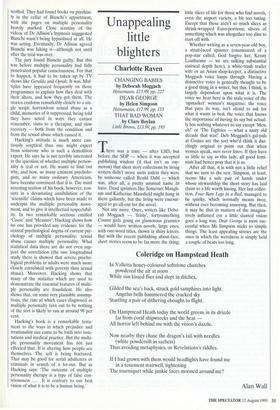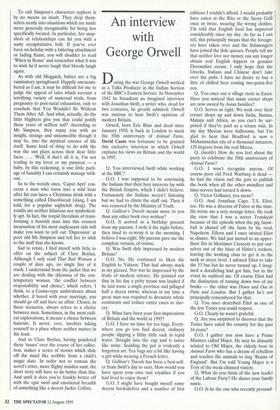Unappealing little blighters
Charlotte Raven
CHANGING BABIES by Deborah Moggach Heinemann, £15.99, pp. 227 DEAR GEORGE by Helen Simpson Heinemann, £12.99, pp. 153 THAT BAD WOMAN by Clare Boylan Little Brown, £13.99, pp. 195 There was a time — after LSD, but before the SDP — when it was accepted publishing wisdom (if that isn't an oxy- moron) that short story collections by living writers didn't move units unless they were by someone called Roald Dahl — which was, after all, a pretty unusual name to have. Dead sprinters like Somerset Maugh- am and Katherine Mansfield might hang in there gallantly, but the living were encour- aged to go all-out for the novel.
Not any more. Once, writers like Debo- rah Moggach — 'feisty', fortysomething Cosmo girls going on glamorous grannies — would have written novels, large ones, with one-word titles, shown in shiny letters. But with the recent publishing about-face, short stories seem to be far more the thing; little slices of life for those who find novels, even the airport variety, a bit too taxing. Except that these aren't so much slices as shrink-wrapped Euro-portions; slivers of something which was altogether too slim to start off with.
Whether writing as a seven-year-old boy, a strait-laced spinster (enamoured of a pop-star called, God forgive her, Kenny Loathsome — we are talking substantial satirical depth here), a white-trash trailer wife or an Asian shop-keeper, a distinctive Moggach voice harps through. Having a distinctive voice is generally thought to be a good thing in a writer, but this, I think, is largely dependent upon what it is. The voice we hear here is the stale voice of the `upmarket' woman's magazine; the voice that pays its way, isn't afraid to ask for what it wants in bed, the voice that knows the importance of having its say but actual- ly has nothing whatever to say except 'Men, eh!' or The Eighties — what a nasty old decade that was!' Deb Moggach's gal-pals at Cosmo are the sort who'd think it daz- zlingly original to point out that when women speak, men never listen. If they have as little to say as this lady, all good femi- nists had better pray that it is so.
After all that, it is with not a little relief that we turn to the rest. Simpson, at least, seems like a safe pair of hands under whose stewardship the short story has laid claim to a life worth having. Her last collec- tion, Four Bare Legs in a Bed, managed to be quirky, which normally means twee, without ever becoming annoying. But then, it may be that in matters of the imagina- tively inflamed eye a little slanted vision goes a long way. Dear George is most suc- cessful when Ms Simpson sticks to simple things. The least appealing stories are the ones in which the weirdness is simply held a couple of beats too long. To call Simpson's characters cyphers is by no means an insult. They drop them- selves neatly into situations which are made more generally recognisable for being less specifically located. In particular, her snap- shots of relationships can hit you with a nasty recapitulative bolt. If you've ever been on holiday with a faltering attachment or fading flame, you will shudder to read `When in Rome' and remember what it was to wish he'd never laugh that bloody laugh again.
As with old Moggach, babies are a big ruminatory springboard. Happily unencum- bered as I am, it may be difficult for me to judge the appeal of tales which recount a terrifying variety of maternal trials, from pregnancy to post-natal exhaustion, only to conclude that You Wouldn't Be Without Them After All. And what, actually, do the little blighters give you that could justify these years of selfless toil? According to Ms Simpson, they repay you with an insight, strange and unnameable though it may be, into the mystical essence of life itself. Some kind of thing to do with the way the sun plays across their dear little faces . . . Well, if that's all it is, I'm not trading in my lover or my pussycat — a baby, by this reckoning, is one little pack- age of banality I can certainly manage with- out.
So to the weirdy ones. 'Caput Apri' con- cerns a man who turns into a wild boar after his son laces a Christmas drink with a something called Discobiscuit (slang, I am told, for a popular nightclub drug). The results are neither hilarious nor symbolical- ly apt. In fact, the torpid literalism of trans- forming a boorish man into this crassest incarnation of his most unpleasant side will make you want to yell out 'Digression' at poor old Ms Simpson and tell her to stick to the stuff that she knows.
Sad to relate, I find myself with little to offer on the subject of Clare Boylan.
Although I only read That Bad Woman a couple of days ago, no single line of it stuck. I understand from the jacket that we are dealing with the dilemma of the con- temporary woman, 'the conflict between responsibility and choice'; which refers, I think, to a Cosmo-type ambivalence about whether, if bored with your marriage, you should go off and have an affair. Choice, in these scenarios, always refers to a choice between men. Sometimes, in the most radi- cal explorations, it means a choice between haircuts. It never, ever, involves taking yourself to a place where neither matter in the least.
And so Clare Boylan, having pondered these 'issues' over the course of her collec- tion, makes a series of stories which slide off the mind like scribble from a child's magic slate. In order not to remain the novel's triter, more flighty maiden aunt, the short story will have to do better than this. And until it does you're frankly better off with the epic swirl and emotional breadth of something like a decent Jackie Collins.



















































 Previous page
Previous page